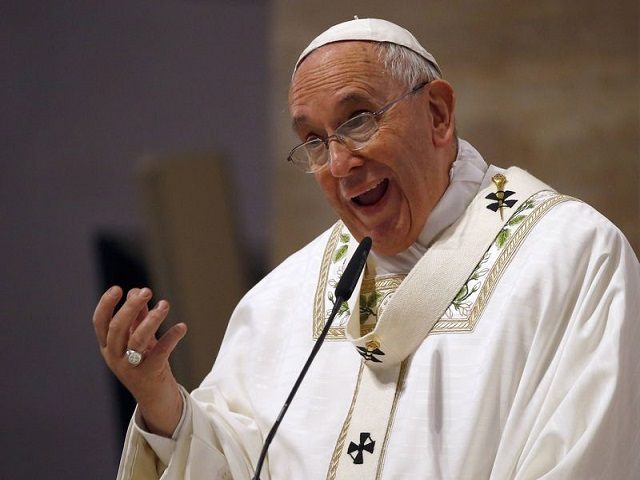DES MOINES, Iowa (AP) — Roman Catholic leaders in the early voting state of Iowa will call Thursday on candidates for president to follow the teachings of Pope Francis and focus as much on the environment and income inequality in 2016 as they have in past elections on opposing gay marriage and abortion.
The vocal pivot from such traditional social issues will mark the first time a U.S. Catholic bishop has publicly asked those seeking the White House to heed the admonitions of Francis’ June encyclical, said Bishop Richard Pates of Des Moines.
In that major teaching document, the leader of the world’s 1.2 billion Catholics called for a “bold sweeping revolution” to correct what he sees as a “structurally perverse” economic system that allows the rich to exploit the poor and has turned the Earth into an “immense pile of filth.”
“The goal of the pope is to raise the questions with all the candidates,” Pates said. “It’s a moral issue, our relationship with creation, our relationship with each other.”
The push from Pates and other bishops in Iowa threatens to disrupt the historically reliable alliance of evangelical Christians and conservative Roman Catholic voters, putting pressure on Republicans who have leaned on their religious faith to guide them on social issues.
It will also focus attention on how the six Roman Catholic seeking the 2016 Republican presidential nomination — former Florida Gov. Jeb Bush, former New York Gov. George Pataki, New Jersey Gov. Chris Christie, Louisiana Gov. Bobby Jindal, Florida Sen. Marco Rubio and former Pennsylvania Sen. Rick Santorum — will wrestle with a pope’s teachings on economics and climate change that clash with traditional Republican ideology.
While Francis has condemned abortion and upheld marriage as the union of a man and a woman, he has not done so with anything approaching the frequency of his two predecessors, Popes John Paul II and Benedict XVI. Instead, Francis has urged church leaders to talk less about such social issues and more about mercy and compassion, so that wayward Catholics would feel welcome to return to the church.
“Pope Francis hasn’t changed church teaching, but he has given greater salience to social welfare and environmental issues, which has put Catholic Republicans in an awkward position,” said John Green, director of the University of Akron’s Bliss Institute of Applied Politics, “particularly if they want to also claim, like many of them do, that religion is important to them.”
Francis is expected to highlight the issues in September when he makes his first visit to the U.S., where he will address a joint session of Congress and the U.N. General Assembly.
Bishops beyond politically important Iowa plan to do so as well. Church leaders in Cincinnati, Ohio, and Richmond, Virginia, plan events related to the encyclical in August, according to the Catholic Climate Covenant, which works with American bishops on the environment.
In Florida, Miami Archbishop Thomas Wenski is planning sermons and events to amplify the pope’s call for action to curb global warming. Wenski is the U.S. bishops’ point person on the environment and has been trying to draw attention to the issue for years.
“There is today broad consensus among scientists that climate change presents real threat to human flourishing on this planet. The church cannot be indifferent,” Wenski said after the encyclical was released.
The GOP candidates vary marginally in their approach to the issues Francis addressed in the encyclical, in which he criticized deregulated free-market economics and argued that climate change was predominantly caused by humans. To date, most have taken the approach that Francis crossed beyond spiritual matters and into public policy.
Bush, for example, called Francis “an incredible leader” during a visit to Iowa last month. But he added, “I don’t go to Mass for economic policy or for things in politics.”
It’s a feeling echoed by many conservative Republican activists in Iowa, and elsewhere.
“Quite frankly, I think he’s got it all wrong,” Loras Schulte, a Catholic and a state Republican committee member from northeast Iowa, said of Francis. “On matters of faith, I will certainly hear him. But these are not matters of faith.”
Steve Scheffler, a Republican and leader in the state’s evangelical Christian community, said Francis’ writings may peel some Catholics away from the existing coalition of evangelical pastors and conservative priests united by their position on issues like abortion.
While Scheffler said that would be unlikely to affect the state’s Republican caucuses in February, it could impact how Iowa votes in November 2016, when it will be likely be among a handful of competitive battleground states.
“You see a lot of coalitions of Catholics and evangelicals working on the life issue together,” Scheffler said. “You could lose some Catholics to this. Some priests buy into that whole social justice, income distribution thing. But not all of them.”

COMMENTS
Please let us know if you're having issues with commenting.